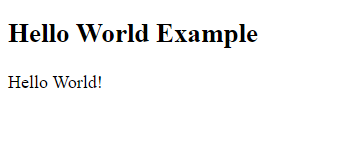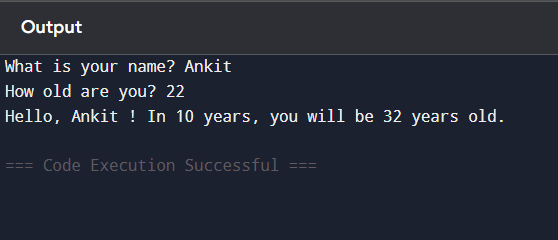Python Coding for Beginners is a collection of exercises and coding problems if you are new to Programming? If not, you will learn how to start with Python programming in this tutorial.
Guido Van Rossum created Python to help people learn programming languages and make it more fun. There are many real world applications of Python that we are about to know. If you are choosing this programming language, learn about some major facts before starting.
Also Read 💡 : Deutsche Bank Internship in India: Role, Eligibility, Stipend 👈
Why Choose Python Coding for Beginners?
Python offers easier syntax and flexibility which help naive beginners get a grasp of programming skills. Python is an interpreted language which means that you do not have any requirement of compiling it first, which makes it easy to use.
Fun Facts About Python Coding for Beginners
- Python is a high level language that makes it easy to read and write code even for beginners.
- Python is an interpreted language which eliminates the uses of any compiler
- Python can be integrated with various models and advanced technologies like Machine learning, data science, deep learning, artificial intelligence tools, etc.
- Python supports Object Oriented Programming which gives access to objects, classes, encapsulation, polymorphism, etc.
Also Read 💡 : Deutsche Bank Internship in India: Role, Eligibility, Stipend – Apply Now! 👈
How to Install Python on a Computer?
In most of the operating systems nowadays python language comes pre-installed. However, if there is no Python in your system you can install it directly on your computer system for free. Especially in the case of Python coding for beginners, they must be familiar with setting up a Python environment on their system.
You just need to go to the official Python website and find the latest stable version to download to your computer. Locate the file after downloading and double-click on the app to start installing. Choose a PATH where you want to store the application.
After successful installation, you can type Python in the command prompt to know whether Python is installed successfully or not.

If you are a beginner looking to learn coding in Python, then this is a tutorial especially made for you. Get links to important Python basics, fundamentals, and coding questions that you might require while starting with Python language.
Also Read 💡 : Top 5 High-Paying Entry Level Jobs for 2025 (Earn Up to $100,000+) 👈
Is Python a Good Choice for Beginners?
Python is an in-demand language that is considered by various companies worldwide. Everyone on their team is looking for a skilled and experienced Python programmer. Well, why so? Because Python developers or Python experts can handle any situation that might arise in the system or programs.
According to the latest surveys, the worldwide demand for Python developers has increased by 40% with companies like Amazon, Apple, Microsoft, Google, Netflix, and many others looking for Python Skills in their job postings.
Also with the latest surveys conducted by Glassdoor, an average Python developer at a fresher stage can earn in the range of 4-8 lakh per annum in India. However, with experience, the package will grow in the coming years. The average salary might depend on the job location and the company.
Programming languages are just a medium to communicate our commands with the computer. The easier the method is, the more fun it is to learn. Python coding for beginners is a great choice as they get to learn everything about the programming language starting from implementing OOPs, scripting, integration, memory management, etc.
Python Hello World! Program for Beginners
The first Python Coding for beginners starts with writing the Hello World! Program.
| # This is a Python “Hello, World!” example.
print(“Hello, World!”) |
This is how easy it is to write a Hello World! Program in Python. You just need not write anything extra; just type the print() command, and Hello World! Text in the bracket.

Python Programming Examples
Let us try to solve a simple problem to understand how to implement Python programming easily.
Example: Write a simple Python program that asks for the user’s name and age and then tells them how old they will be 10 years from now.
| name = input(“What is your name? “)
age = int(input(“How old are you? “)) future_age = age + 10 print(f”Hello, {name}! In 10 years, you will be {future_age} years old.”) |
The input() prompt here is used to get input from the user. Here, users will enter their name and age.
The input is converted into an integer using the int() prompt. Now, we will simply apply the logic and display the output to the users on the screen.
Also, Learn the Basics of Python Programming Langauge
Output

Writing Python code is very easy, you just have to start typing with whatever logic comes into your mind. Most of the Python syntax is based on simple English language and does not need any additional classifiers or statements.
However, Python indentation is important to be taken care of while writing Python coding for beginners.
What is Python Indentation?
Indentation in Python refers to the spaces left at the beginning of the code to define the complete programming in a well structured manner. Unlike other programming languages, Python does not use braces {()} for closing or opening any block of code.
This helps Python to define the hierarchy and flow of the program easily. If indentation is not applied properly at each line it will throw a syntax error in Python.
Hence, especially python coding for beginners must learn Indentation before starting with coding in Python language. Let us check a simple indentation example below.
| def greet(name):
print(f”Hello, {name}!”) greet(“Alice”) |
This is a simple example of a function in Python represented using the indentation blocks. You can clearly see the program well enclosed with the indentation and without any braces or brackets used in between the code.
Dynamic Typing Using Python Language
Python supports dynamic typing which means you will not need to specify the data type of a variable explicitly in the language. You do not need to specify the variable type, python will determine the type during the runtime.
| #Check the following code we are not explicitly mentioning any data type of the variable, python will determine it during the runtime.x = 10 # x is an integer
x = “Hello” # Now x is a string |
What is Python Interpreted Language?
Python executes every line of code line by line which makes it easy to debug. There is no need for separate compilation in Python programming language, unlike other languages such as C++, Java, or others.

Python programs are executed directly from the source code in real-time using an interpreter. We start writing Python code with a .py extension file. When the code runs in the interpreter, Python internally converts the source code into bytecode which is then executed by the Python Virtual Machine (PVM).
Being an interpreted language, Python coding offers many advantages for beginners.
- Easy to debug code
- Portability is enhanced compared to other languages
- More flexible to make changes in the code
Python vs Compiled Languages
| Python Language | C++/Java Languages |
| It is an interpreted language | They are compiled languages |
| The code is executed line by line | The whole code/program is executed at once |
| Slower as compared to a compiled language | Faster as compared to the interpreted language |
| Code running stops after finding the error | Error found after compilation |
| Platform-dependent programming language | Often requires compilers to run |
Python Coding for Beginners: Extensive Standard Library
Python offers a large and extensive standard library for executing various programming tasks easily during web development.
| Library | Syntax |
| pandas | import pandas as pd |
| NumPy | import numpy as np |
| dask | import dask |
| matplotlib | import matplotlib.pyplot as plt |
| seaborn | import seaborn as sns |
| plotly | import plotly.express as px |
| bokeh | from bokeh.plotting import figure, show |
| sci-kit-learn | from sklearn import datasets |
| TensorFlow | import tensorflow as tf |
| keras | from tensorflow import keras |
| PyTorch | import torch |
| flask | from flask import Flask |
| Django | import django |
| beautifulsoup4 | from bs4 import BeautifulSoup |
| scrappy | import scrapy |
| requests | import requests |
| scipy | import scipy |
| sympy | import sympy as sp |
| selenium | from selenium import webdriver |
| pyautogui | import pyautogui |
| pygame | import pygame |
| sqlalchemy | from sqlalchemy import create_engine |
| pymongo | import pymongo |
| py test | import pytest |
| unit test | import unittest |
| socket | import socket |
| asyncio | import asyncio |
| opencv-python | import cv2 |
| pillow | from PIL import Image |
| itertools | import itertools |
| random | import random |
| os | import os |
Python Built-In Garbage Collection
Python language handles memory management automatically at a regular interval of time. You will need not to worry about allocating and deallocating memory all by yourself. This adds up to one more advantage of choosing Python coding for beginners.
Cross-Platform Support Python
Python codes can run on multiple operating systems or devices such as Windows, MacOS, Linux and even Android or iOS platforms on mobile. You will not be required to carry any change in the program manually before running the program or changing the platform.
Object Oriented Programming using Python
Python supports OOPs and procedural programming which can be used for small to large scale projects. It supports objects and classes which improve code reusability, modularity, and abstraction. With OOPs python codes can successfully implement abstraction, inheritance, polymorphism, etc.
Learn Python Language with PW Skills
Become an expert in Python programming with PW Skills self-paced Course Decode DSA with Python. Learn all about Python fundamentals, syntaxes, coding, examples, tools, libraries, and more within this course.
Practice real world practice questions and module level assignments and more. Prepare for competitive programming with Python within this course.
Python Coding for Beginners FAQs
Q1. Is Python good for beginners?
Ans: Python is an in-demand programming language much better choice for anyone who is looking to start fresh with programming. Learn programming in a better way with Python language and experience a wide range of career opportunities in the field.
Q2. Does Python support OOPs?
Ans: Python supports Object Oriented Programming language which makes its program reusable and modular. It is easier to implement classes and objects with Python language.
Q3. Is Python an interpreted language?
Ans: Python is an interpreted language which means it executes its program line by line and hence can easily find bugs and other errors in the code during run time easily.
Q4. What is Python coding for beginners?
Ans: Python for beginners is a page that provides a step-by-step tutorial for learning Python programming language, its best features, and tutorials.

